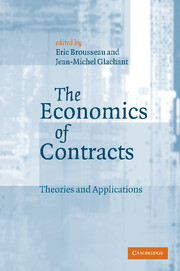Book contents
- Frontmatter
- Contents
- List of figures
- List of tables
- List of contributors
- Acknowledgments
- Part I Introduction
- Part II Contracts, organizations, and institutions
- Part III Law and economics
- Part IV Theoretical developments: where do we stand?
- Part V Testing contract theories
- Part VI Applied issues: contributions to industrial organization
- Part VII Policy issues: anti-trust and regulation of public utilities
- 22 Inter-company agreements and EC competition law
- 23 Incentive contracts in utility regulation
- 24 Contractual choice and performance: the case of water supply in France
- 25 Institutional or structural: lessons from international electricity sector reforms
- 26 Electricity sector restructuring and competition: a transactions-cost perspective
- Bibliography
- Index of names
- Subject index
22 - Inter-company agreements and EC competition law
Published online by Cambridge University Press: 16 January 2010
- Frontmatter
- Contents
- List of figures
- List of tables
- List of contributors
- Acknowledgments
- Part I Introduction
- Part II Contracts, organizations, and institutions
- Part III Law and economics
- Part IV Theoretical developments: where do we stand?
- Part V Testing contract theories
- Part VI Applied issues: contributions to industrial organization
- Part VII Policy issues: anti-trust and regulation of public utilities
- 22 Inter-company agreements and EC competition law
- 23 Incentive contracts in utility regulation
- 24 Contractual choice and performance: the case of water supply in France
- 25 Institutional or structural: lessons from international electricity sector reforms
- 26 Electricity sector restructuring and competition: a transactions-cost perspective
- Bibliography
- Index of names
- Subject index
Summary
Introduction
In a free-market economy, suppliers are supposed to adopt their strategic decisions in a totally independent manner. In this respect both tacit and explicit agreements are forbidden by the texts governing competition within Europe, as in the United States. However, Community law has seen fit to include a proviso for possible dispensations from the rule concerning independence of behavior between competitors, when agreements between them enhance production, distribution, or the promotion of economic progress and so long as competition in the ongoing market be maintained to a sufficient degree. Many agreements may therefore be considered to be in accordance with this principle when the advantages they represent outweigh the accompanying competition restraints. Given the impossibility of making an individual examination of each agreement because of their number, the Brussels Commission is now authorized to decree “exemptions by category” for certain types of agreements. Candidates for a cooperation operation are presented with two procedures when they seek validation by community authorities of the operation in question. In accordance with the contractual clauses of their project within the legal framework laid down by the exemption, regulations also afford them, in principle, exemption from any prior notification. Otherwise, companies are required “to present the Commission with the supporting documents needed to establish justification of individual exemption and, where the Commission might raise objections, to propose alternative action.”
One of the greatest merits of Community authority intervention in the field of free-market functioning control is to have recognized very early that the promotion of technical progress could be ensured only if companies could be made largely exempt from the principle of independence (section 2).
- Type
- Chapter
- Information
- The Economics of ContractsTheories and Applications, pp. 395 - 415Publisher: Cambridge University PressPrint publication year: 2002



